There’s a whine we’ve been hearing from Republicans with ever-increasing frequency since the start of Obama’s presidency: that the United States is less respected than it was in the Bush era, and especially that his leadership is seen as both weak and of poor quality. They especially like to contrast Obama with Vladimir Putin, to the detriment of Obama, and insist the reputation of the country has suffered under his presidency. This could not be further from the truth.
I’ve written a short post about this before: Obama vs Reagan: The Bogus GOP Comparison. We’re hearing a lot about Reagan again of course – we’re in an election cycle and Republican candidates always do all they can to align themselves with Reagan; it’s a tactic that tests well in focus groups. The fact that the Reagan Legend has little to do with reality seems to be irrelevant. Rachel Maddow covered some of the problems with the legend earlier in the week – see here for video of her Reagan take down. Suffice to say, there’s a lot to criticize.
Republicans also say, now that they’re forced to admit the error of the Iraq war, that it was the only reason that President George W Bush was unpopular. However, we in the rest of the world already had a pretty low opinion of Bush, and, in fact, a great deal of anger towards him and US Republicans before the disaster in Iraq.
During the early days of Bush’s presidency, he faced major protests wherever he traveled around the world. His failure to sign the Kyoto Protocol and to deny man-made global warming was even real when his country was the world’s biggest emitter of greenhouse gases made him beneath contempt in the eyes of many.
From CNN on 12 June 2001:
U.S. President George W. Bush has arrived in Madrid on his first official visit to Europe since taking office.
He is facing international criticism on the issues of global warming and his plans for a national missile defence system.
…
Many European allies are angry at Bush for his opposition to the accord and have expressed scepticism about his plans to deal with global warming.
There have been protests in Madrid against the Bush administration’s environmental policies. Three protests have been held since Sunday.
“We want to tell him that he is not welcome here if he keeps with his policy to reject the Kyoto Protocol, the first and only international agreement against climate change,” said one demonstrator representing Greenpeace.
Then 9/11 happened, and you don’t kick somebody who’s been through something like that.
The myth of Obama’s leadership and, by association, the USA being disrespected was brought up again last week with the final State of the Union address. He stated that the status of the United States had increased over the course of his presidency; several GOP candidates for their nomination have since charged him with being a liar and delusional.
My personal impression is that the United States is far more respected now as we approach the last year of Obama’s presidency than it was eight years ago. My opinion doesn’t make it so though, so I checked out the data. It shows that not only is the leadership more highly thought of these days, world opinion of the man Republicans compare Obama unfavourably with, Vladimir Putin, has been dropping steadily.
Since 2007, Gallup has been asking about presidential approval not just in the US, but in 135 other countries. They have also compared leadership approval (or otherwise) with that of Russia, China, the European Union, and Germany. They report that:
Our first measurement in 2007 found subpar global approval ratings of the U.S. A median of 38% of the world approved of the job performance of the leadership of the U.S., nearly matching global approval ratings of China’s leadership. Two years into our tracking, President Barack Obama took office and approval ratings soared. A median of 48% of the world approved of the job performance of the leadership of the US at the time – the highest approval rating of a world power that Gallup has seen in its history of tracking. Median approval of U.S. leadership has been mostly stable during Obama’s time in office and been among the highest in the world when compared with Russia, China, the EU and Germany – and has been the highest for two years running.
That sounds to me like a pretty thorough endorsement of Obama by the international community. And as Gallup points out, that means the US wields a lot of soft power. Republicans seem to want someone who gets their way by bullying and threatening. That might work short-term, but long term it is soft power that works. You catch a lot more flies with honey that vinegar, as the old saying goes.
As for the Republican hero Putin, Gallup reports:
Russia is the only country whose leadership receives higher disapproval ratings than approval ratings. Median approval is flat at 22% [less than half that of Obama], while median disapproval is 36%, its highest level since 2007.
Internationally, approval of US leadership is looking pretty good.
Of the 135 countries surveyed, only fifteen have a higher disapproval than approval rating of US leadership. They’re largely the countries you’d expect. The highest ten are:
Russia 82%, Palestinian Territories 72%, Belarus 69%, Lebanon 66%, Pakistan 65%, Iran 61%, Egypt 58%, Austria 55%, Slovenia 54%, Tajikistan 54%.
The ten countries with the highest opinion if US leadership are:
Senegal 81%, Kosovo 81%, Chad 77%, Rwanda 76%, Congo Kinshasa 74%, Burkina Faso 74%, Albania 74%, Guinea 74%, Mali 74%, Gabon 72%, Congo Brazzaville 72%.
Germany (Angela Merkel) comes in a pretty close second to Obama, with 41% median approval in 2014 and median disapproval at 22%.
The European Union at third gets similar ratings to Germany: 39% medial approval and 26% median disapproval.
China (Xi Jinping) has median approval of 29% and median disapproval of 28%. All the countries that rate China most highly are in Africa, and many are the same ones that rate the US highly. My assumption is this is a sign of the US and China spending foreign aid in those countries to help retain their friendship – an example of how soft power is gained. It is the reason all those presidential candidates who say that all overseas aid should be stopped are not only wrong, they’re stupid. If the US stops helping those countries, all their allegiance will be to China. Further, foreign aid is both cheaper and far more useful to the countries concerned than the potential future cost of conflict.
Russia’s median approval rating is 22%. It always receives the lowest rating, and the latest rating is a new low for them. Their current median disapproval rating is 36%, which is the highest rating they’ve received since the survey began.
Only seventeen of the 135 countries surveyed had more people approving of Putin’s leadership than disapproving of it – almost exactly the opposite of Obama. Six of those are former Soviet republics: Tajikistan, Kyrgyzstan, Kazakhstan, Armenia, Uzbekistan, and Belarus.
Interestingly, as Russia’s reputation has fallen internationally, within Russia it’s risen. When asked separately about their opinion of their own country’s leadership, 68% of Russians gave it their approval. I suspect it’s no coincidence that Russian control of the media, especially television (where most Russians get their news), has a lot to do with this,
Countries with the highest disapproval ratings of Russia are those that know them best – their neighbours. The ten highest disapproval ratings came from: Norway 89%, Netherlands 86%, Finland 86%, Switzerland 83%, Sweden 82%, Germany 81%, Ukraine 81%, Belgium 80%, Italy 78%, Canada 77%.
It was in 2014, of course, that Malaysian Airlines flight MH17 was shot down over Ukraine. Of the 298 passengers and crew aboard, 189 were from the Netherlands. Russia used to be fairly popular in Ukraine – their takeover of Crimea and military action in the east of the country saw Ukraine’s approval of Russian leadership fall a whopping 41 points between 2013 and 2014. Latvia and Lithuania have also seen big drops in their approval of Russian leadership (sixteen and fifteen points respectively). Both countries have reported to NATO that they consider that their membership of the organisation is the only reason they haven’t gone the way of Georgia and Crimea.
At the end of July 2015, Russia used their UN Security Council veto power to prevent an independent enquiry into the downing of flight MH17. The missile that destroyed plane was a Buk missile system that couldn’t have been in the hands of the Ukranian separatists without the full knowledge and cooperation of Russia. Further, a member of the Russian military has been informally identified as operating the equipment. It was this incident that made it impossible for Russia to continue to credibly deny their military’s involvement in Ukraine.
The following graph shows Ukrainian opinion of the five world leaders surveyed:
Despite the accusations of Russia, there hasn’t been a huge move towards other leaders – opinion has remained fairly steady. There was the big jump in US approval that most countries saw with the inauguration of President Obama, and Russia was more popular under President Medvedev, but it doesn’t look like there’s been any manipulation of public sentiment.
It seems clear to me that the claims of Republicans that the reputation of the United States has suffered under President Obama are outright lies. It is a claim not supported by data obtained by a reputable company that is freely available.
If Republicans plan to unleash their idea of leadership on the world – the bullying and bluster of Donald Trump, or the sanctimonious smarminess of Ted Cruz – I guarantee the international approval ratings of US leadership will begin to trend downwards once again, just like last time there was a Republican in office.

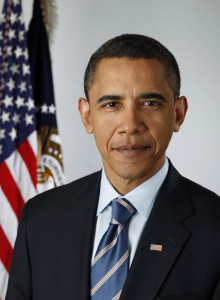
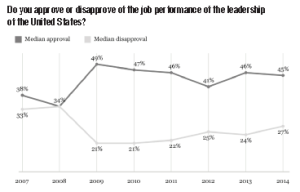
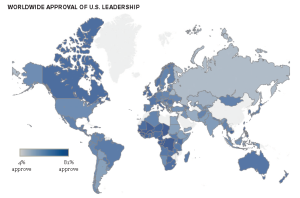
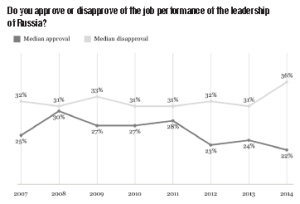
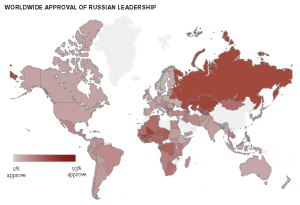
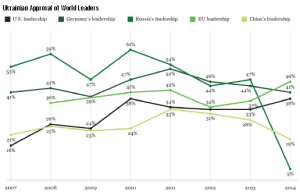
Obama’s critics, of course, are not talking about popularity contests. They are simply making the observation that the world’s despots, quite rightly, see Obama as a trifling fool they can easily roll.
Public opinion has little if anything to do with apportioning power in the real world of geopolitics.
Bravo Heather. A lot of us Americans realize that Obama is a fine man and has done a pretty good job given the difficulties he has faced.
I do question your conclusion that the countries that ranked Russia lowest were the ones that know them best. Poland, Hungary, Bulgaria, Rumania, Czechoslavakia, E Germany, along with the central asiastans, would seem to be the one who know Russia the best.
I think Obama will be seen, in time, as a very high ranking U.S. president. In spite of being faced on taking office with a humongous world recession, he had a completely dysfunctional congress after his first 2 years.
I’m very curious why Ukrainians disfavor Germany lately. Anyone?
Germany has been the main mediator in the conflict between Russia and the Ukraine. Putin trusts Merkel as much as he trusts anyone that is). Merkel has done a pretty good job at being fair to both sides, but among the general population each side naturally sees any point conceded to the opposition as being against them. My guess is that the main problem the Ukraine population has with Merkel is that she’s going out of her way to find a diplomatic solution to the conflict, which is actually by far the best solution for Ukraine. However, there are plenty of Ukrainians who think they could win a military conflict if they were just given the weapons. They resent Merkel for not arming them.
Arming Ukrainians is not something Merkel could do even if she wanted to. The German military is fairly weak – it was deliberately kept that way after WWII.
Thanks for the info. Interesting stuff.
Thanks, Heather, a most welcome data-based assessment. Given all the American-bashing lately (lots by us Americans, of course, both right and left!) it’s most welcome to hear something positive. And despite the mess that is the modern world it is still inspiring to remember that the US elected Obama not once but twice. Yes, they also did Dubya, but he was your typical inside guy with clout, while BHO was about as far from business as usual one could get.
Were Greenland & Iceland not polled? I find it interesting that so many African nations seem parallel in their support for both Obama and Putin. Given their relative histories, perhaps they’ve learned to hedge their bets…
Russia, China, and the US all spend a lot of money in Africa (and the Pacific) to get small, poor nations on their side. A lot of it is vote-buying at the United Nations – Nauru gets the same number of votes as any other country. If it’s handled properly, this “international aid” can be useful for the countries concerned. However, depending on the country, a lot of it feeds already endemic corruption.
NZ and Australia, for example, also spend a lot in the Pacific, but we can’t compete with the big nations. We mostly do it by partnering with them on specific projects such as a school or hospital. A big focus is to get electricity to all islands eventually via solar electricity (many currently run on generators run via expensive imported, polluting fuel.) Tuvalu is set to become the first island run on 100% solar power. (To be fair, the G8 nations have been good about providing funding for that.)
I am acutely embarrassed to admit that I’d never even heard of Nauru!
But otherwise, yes, the quid pro quo alliances are exactly what one expects. Here in the western hemisphere, e.g., much of Latin America is being assiduously courted by China.
The AUS/NZ initiatives you describe are inspiring.
I was just remembering, yesterday, how that man threw his shoes at Bush. Trust me when I say that Canadians really disliked him. He called England “America’s greatest friend” because of the Iraq war and ignored the advice of America’s real “greatest friend”, Canada, who refused to go to war with him.
Obama, on the other hand, is more popular in Canada than he is in the US and Canadians really like him.
Same in NZ. Although we’re part of Five Eyes too etc, we’re not actually an official ally of the US, and haven’t been since the early 70s because we refuse to have their ships in our harbors unless they confirm they’re not carrying nukes (in compliance with our no nukes policy).
Obama is very popular here, and not just among those of a liberal bent. He and our centre-right PM have become friends too. They’re the same age, both elected in 2008, had single mothers, have houses near each other in Hawaii from where they meet to play golf, and I recognize several of our PM’s policies coming out of Obama’s mouth too.
Bush was very unpopular. As you know, we didn’t go to Iraq either, and the reason I remembered all the environmental stuff was because NZers were really angry with Bush for his denier stance. It didn’t help that Al Gore should have been president, and he would have taken the US on a completely different track regarding climate change. The corruption of that election was quite shocking to us as although we’re far from perfect ourselves, our electoral system has a very high level of integrity.
“The corruption of that election was quite shocking to us…”
And to quite a few of us Americans, too.
Since Kyoto is offered as an explanation for pre-9/11 Bush Derangement Syndrome, it is only fair to note that although Clinton ostensibly approved it, he never got around to submitting it for ratification. The reason for that is simple: The Senate preemptively passed a resolution repudiating it. (The vote was not merely bipartisan but indeed was unanimous.)
If this episode is the genesis of international Bush Derangement Syndrome, so be it. The president’s job is to represent the will of the people of his own country, not to appease international elites and pressure groups. (No doubt President Bush was heartbroken at losing the Greenpeace endorsement.) We’ll never know to what extent a President Gore might have been able to foist his climate change ideology on America, because the Democrats failed, thankfully, in their cynical ploy to overturn the election by rigging rules after the fact.
Millions of people in this country and around the world deeply admire President Bush as one of the most decent men ever to hold that office, and we will be forever grateful for his extraordinary leadership during a difficult time. If that sentiment doesn’t register in Gallup polls or Nobel nominations or Davos cocktail party chatter — good. So much the better.
And if Canada likes Obama, they can have him.
Why do you always have to make personal insults about those with a different opinion to you?
I agree GWB is a decent man, and I never said otherwise. Being good and decent doesn’t make you right.
Man-made climate change isn’t a delusion of elites and pressure groups – it is science that is accepted by a majority of scientists, most world leaders, and the populations of most countries consider it a serious problem. The Republican party in the US is an international outlier – they are the only major political party in the world that denies man-made climate change.
Gallup is a polling agency with a reputation for accuracy and integrity in the way it conducts its polls. Not liking the result of a poll doesn’t change that.
It’s the blue pill, Heather. Can’t argue successfully with with someone who’s sense of reality is driven by by ideology. Facts just don’t matter. As Harris says: “If someone doesn’t value evidence, what evidence are you going to provide to prove that they should value it? If someone doesn’t value logic, what logical argument could you provide to show the importance of logic?”
“Decent” men don’t torture. Decent men don’t cook the evidence in order to invade a country that had not attacked us, with weapons against which they had no defense, killing many thousands of innocents. Bush is an ignorant, privileged bully who not only presided over one of the greatest foreign policy debacles in American history, but whose crony capitalism brought on one of the worst economic disasters also. What is “decent” about that? There is no doubt that Gore won the popular vote in 2000, and subsequent investigations showed that he won the vote in Florida, but there was not a statewide recount due to the machinations of his governor brother and the partisanship of the majority on the Supreme Court. One good measure of how much GWB is admired in the US today is how Jeb is doing in the Republican primary, in spite of the millions poured into his campaign by his fat cat supporters. You can be sure he is even less popular with Dems.
President Bush’s favorability among Republicans is 77%, so it’s not clear that he’s responsible for his younger sibling’s low-energy primary candidacy. (President Bush’s favorability among the general public (45%) is better than Hillary Clinton’s, and within the margin of error behind Obama’s.)
In 2000, President Bush won the Florida vote, and thus the election, under the rules in effect at the time votes were cast. It’s not the case that subsequent investigations showed that Gore won Florida. The most they could do was show that if you twisted the rules enough in various ways favorable to Gore, you could eventually come up with certain scenarios that went his way.
Needless to say, we’ll have to agree to disagree on your assessment of President Bush’s service.
I do not know who has it right over Florida (there are too many legal ins and outs), but the national popular vote was with Gore, and it’s clear that a majority in Florida wanted to vote for Gore.
I seem to remember there being a question over corruption in the counting of votes in another state too at the time. Ohio maybe?
http://www.theguardian.com/world/2001/jan/29/uselections2000.usa
The Ohio question involved voting machines in the 2004 election. Bush won the popular vote nationally, but if Ohio had switched, Kerry would have been elected. Diebold the voting machine manufacturer was a big Bush supporter. The vote in Ohio and their were questions about some of the machine totals.
Yes, several officials were convicted in Ohio if I remember right. And in Florida one of the scandals was around voter suppression via invalid purging of the roles that targeted Dem leaning demographics. Plus there was Sandra Day O’Connor saying that she wanted Bush to win so that she could retire from the Supreme Court. Of course she didn’t then recuse herself for the obvious conflict of interest from the decision that saw Bush selected by the SC 5-4.
Now Gore gave up when he had other avenues to challenge the result, but anyone who thinks Bush won fare and square has been at the blue pills again.
Spot on! I remember writing about this on a post when another one of your readers said the last 8 years as being “miserable” because of Obama. There is no use arguing with that person, but I’m glad to see the truth prevail.
I do distrust polls as data however, especially ones that try to poll the whole world. Do they really have a sufficient sample from each country and were they chosen randomly? Where opinions are not strong about something there are many factors that can affect the answers. What were the previous questions asked, for example.